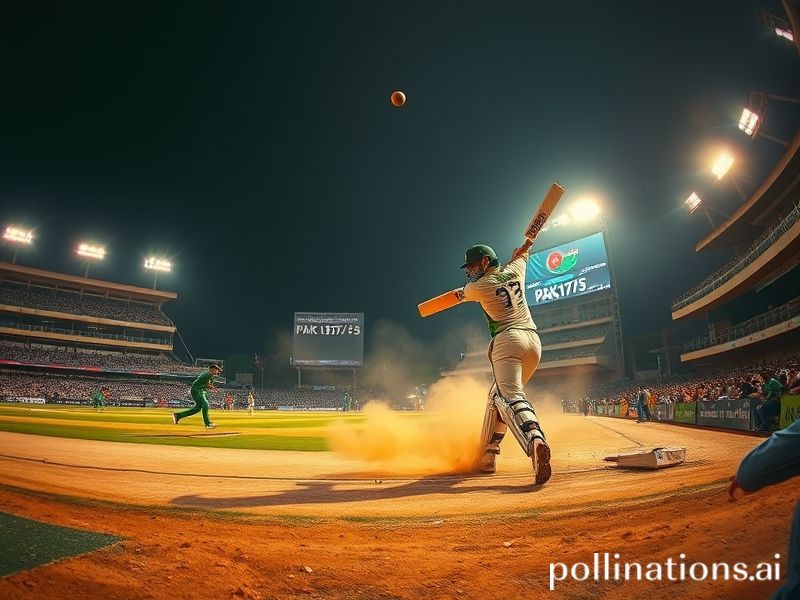Pakistan vs Bangladesh: When Cricket Becomes the World’s Most Polite Civil War
Cricket, that Victorian fever dream exported to the colonies, has a way of turning neighbors into gladiators. On Sunday, the Eden Gardens floodlights will illuminate another installment of Pakistan versus Bangladesh—an affair that, on paper, is merely another Super-12 fixture in the T20 World Cup. Yet in a world where wars freeze for football and stock markets twitch for tennis, this eleven-a-side ritual carries the weight of two national identities still negotiating the aftershocks of 1971.
Let’s set the scene. Pakistan arrives nursing the familiar heartburn of a bowling attack that oscillates between unplayable and unwatchable. Bangladesh lands with the quiet confidence of a side that has learned to win ugly and lose photogenically. Between them lies the awkward family history: one country midwifed the other through a blood-soaked partition, then spent decades pretending the labor pains were merely a misunderstanding. The scoreboard on Sunday will read runs and wickets, but the subtext will whisper body counts and lost maps.
For the global audience, the match is a convenient morality play. Western broadcasters will package it as “South Asian rivalry,” the same bland label they slap on samosas and nuclear brinkmanship. Streaming platforms will serve patriotic ads urging NRIs to remit more dollars, because nothing says diaspora love like monetizing nostalgia. Meanwhile, Chinese phone manufacturers—official partners, naturally—will flash slogans about “capturing every edge,” blissfully unaware of the irony when Kashmir is only a hotspot discussion away.
The real intrigue, however, sits in the VIP boxes. Observers from the IMF will note whether Pakistan’s brittle middle order collapses faster than its foreign reserves. Analysts from the World Bank will time how long it takes Bangladesh’s openers to score what the nation spends daily on climate adaptation. And somewhere in the commentary box, a retired English captain will compare Shaheen Afridi’s yorkers to “precision drone strikes,” apparently forgetting that actual drones are still a touchy subject in Waziristan.
On the street, the stakes are simultaneously cosmic and trivial. In Lahore, barbers will refuse tips if Rizwan gets out early; in Dhaka, ride-share drivers will offer free trips every time Shakib swats a boundary. Both capitals will momentarily forget their respective inflation rates—Bangladesh at 9.3 %, Pakistan at a breezy 29 %—because sport provides the cheapest form of time travel. For three hours, fathers remember being sons, and nations remember being possibilities rather than problems.
Geopolitically, the game is a soft-power audition. Pakistan needs to remind the world it is more than a terror-alert abbreviation, while Bangladesh wants to graduate from “least-developed” to “next Tiger” without tripping over its own garment workers. A win won’t rewrite trade treaties, but it will nudge foreign correspondents toward lighter adjectives—always useful when you’re courting sovereign wealth funds that still confuse Dhaka with Dakar.
And then there is the diaspora calculus. London’s curry mile will divide into green and red jerseys, Toronto’s Uber fares will surge around sports bars, and Dubai’s construction sites will empty as laborers huddle around cracked phone screens. Every boundary will trigger WhatsApp fireworks in family groups otherwise muted by political disagreements and wedding expenses. In an age when migration is mandatory but belonging is optional, a cricket match offers the rare illusion of home delivery.
Come the final over, one anthem will feel slightly louder, one flag marginally heavier. The victor will celebrate like tomorrow is guaranteed, the vanquished will mourn as though history itself has been rewritten. Both reactions are, of course, preposterous—tomorrow’s headlines belong to heatwaves, coups, and crypto crashes—but that is precisely the point. In a world short on certainties, even a meaningless game can masquerade as destiny.
So tune in, dear reader, not for the runs but for the ritual. Watch how quickly we outsource our emotions to twenty-two hired men in pyjamas, how readily we trade generational trauma for sixes and dot balls. And when the last wicket falls, spare a thought for the real contest: the eternal human talent for turning leather and willow into the stuff of hope. Because if we can still believe in a game, perhaps we can still believe in each other—though the odds, unlike the match-fixing scandals of yore, remain depressingly fair.







